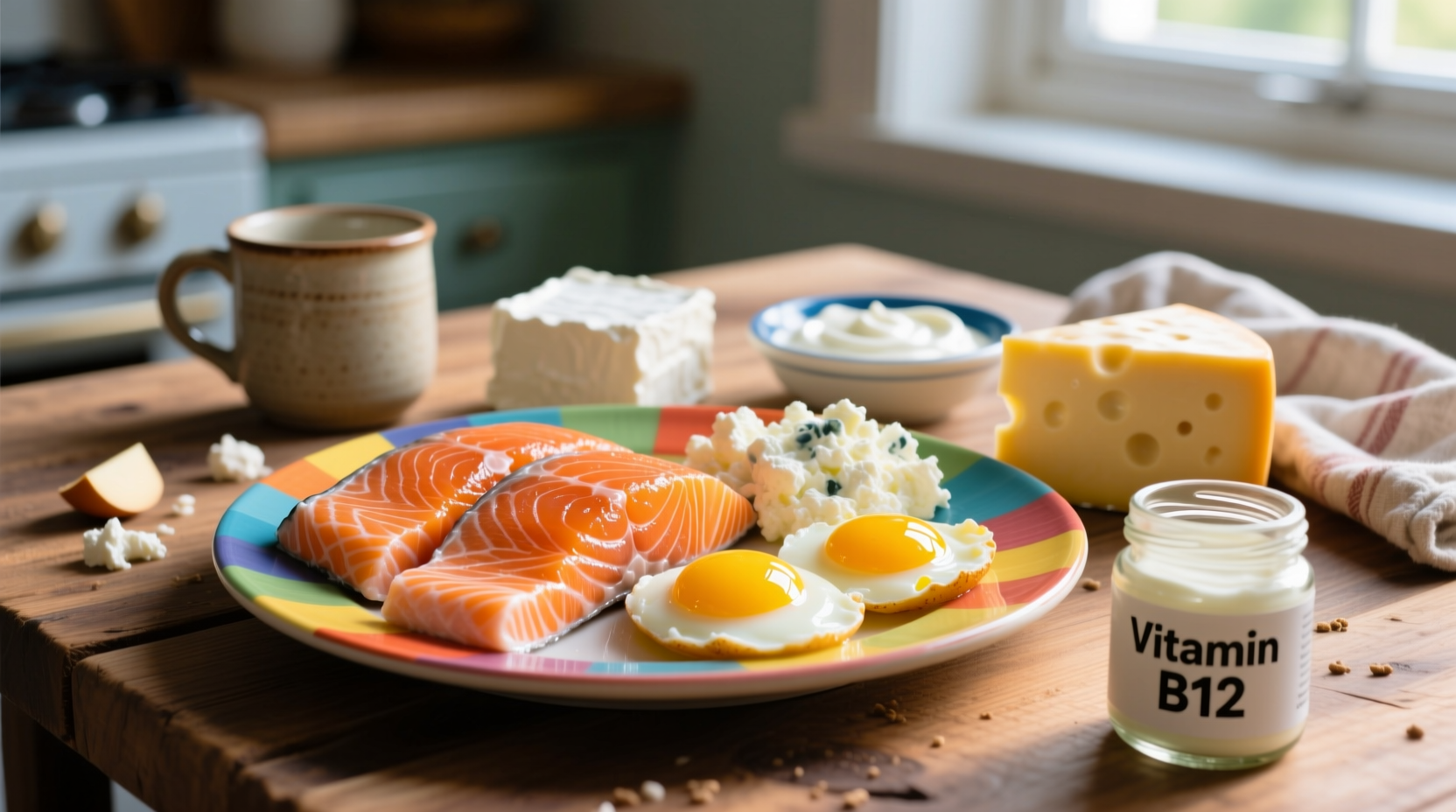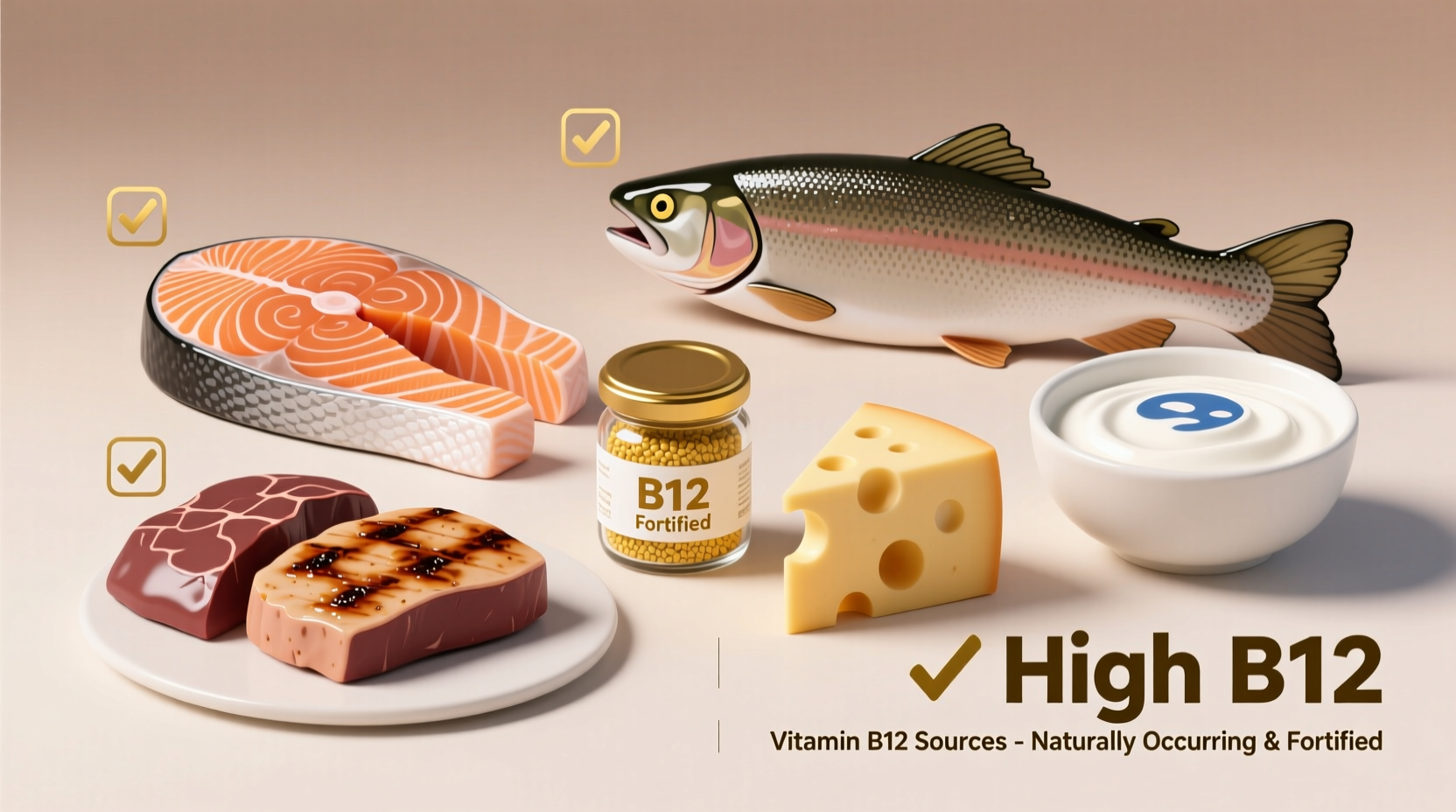Vitamin B12 is found naturally only in animal products. The top three foods highest in B12 are clams (84 mcg per 3 oz, 3,500% of daily value), beef liver (70 mcg per 3 oz, 2,900% DV), and salmon (4.9 mcg per 3 oz, 205% DV). Adults need 2.4 mcg daily, with higher requirements for pregnant or breastfeeding women.
If you're searching for what foods contain high b12, you're likely concerned about meeting your nutritional needs—whether you're adjusting your diet, following a vegetarian or vegan lifestyle, or addressing potential deficiency symptoms. This guide delivers science-backed information on the most potent natural sources of vitamin B12, verified by nutritional science authorities.
Why Vitamin B12 Matters for Your Health
Vitamin B12 (cobalamin) plays critical roles in your body that many people overlook. This essential nutrient supports:
- Nerve function and neurological health
- Red blood cell formation
- DNA synthesis
- Energy metabolism
Unlike other vitamins, your body can't produce B12 naturally. According to the National Institutes of Health, deficiency affects 1.5-15% of the general population, with higher rates among older adults and those following plant-based diets.
Understanding Your Daily B12 Requirements
Your B12 needs vary based on age, health status, and life stage. The Recommended Dietary Allowance (RDA) established by the Food and Nutrition Board includes:
- Adults (19+ years): 2.4 mcg daily
- Pregnant women: 2.6 mcg daily
- Breastfeeding women: 2.8 mcg daily
- Adults over 50: Higher intake recommended due to reduced absorption
It's crucial to understand that absorption rates vary significantly. The NIH reports that only about 1.5-2 mcg of a typical dietary supplement can be absorbed at one time in healthy individuals.
Natural Food Sources Highest in Vitamin B12
When evaluating what foods have the most vitamin b12 naturally, animal products consistently rank highest. Here's what nutritional science reveals about the most concentrated sources:
Organ Meats: Nature's B12 Powerhouses
Beef liver stands as one of the most concentrated natural sources of B12. A 3-ounce serving provides approximately 70 mcg—nearly 2,900% of your daily requirement. This makes it particularly valuable for addressing deficiency, though consumption should be moderated due to high vitamin A content.
Seafood: The Ocean's B12 Bounty
Clams take the top spot for B12 density. Just 3 ounces of cooked clams contain about 84 mcg of B12. Other excellent seafood options include:
- Salmon (3 oz): 4.9 mcg (205% DV)
- Tuna (3 oz): 2.5 mcg (105% DV)
- Trout (3 oz): 5.4 mcg (225% DV)
- Sardines (3 oz): 8.0 mcg (332% DV)
| Food Source | Serving Size | B12 Content (mcg) | % Daily Value |
|---|---|---|---|
| Clams | 3 ounces | 84.0 | 3,500% |
| Beef Liver | 3 ounces | 70.0 | 2,900% |
| Rainbow Trout | 3 ounces | 5.4 | 225% |
| Salmon | 3 ounces | 4.9 | 205% |
| Tuna | 3 ounces | 2.5 | 105% |
| Low-fat Milk | 1 cup | 1.2 | 50% |
| Swiss Cheese | 1 ounce | 0.9 | 38% |
| Eggs | 1 large | 0.6 | 25% |
B12 Sources for Vegetarians and Vegans
If you're searching for what plant foods contain b12, you'll find limited natural options. True vegetarians and vegans need strategic planning:
- Nutritional yeast (fortified): 2.4-8 mcg per tablespoon
- Fortified plant milks: 0.5-3 mcg per cup
- Fortified breakfast cereals: up to 6 mcg per serving
- Some algae products (though research on bioavailability is mixed)
The Academy of Nutrition and Dietetics confirms that vegans require fortified foods or supplements to meet B12 needs, as no plant foods contain reliable, bioavailable B12 naturally.
Maximizing B12 Absorption from Food
Knowing what foods are high in b12 is only half the equation. Your body's ability to absorb this nutrient matters significantly:
- Stomach acid is essential for separating B12 from protein—older adults often need supplemental forms
- Cyanocobalamin (supplement form) has higher stability than methylcobalamin
- Consuming B12 with protein-rich meals enhances absorption
- Some medications (like proton pump inhibitors) reduce B12 absorption

Special Considerations for Different Dietary Needs
Your optimal B12 strategy depends on your specific circumstances:
For Older Adults
After age 50, up to 30% of people have reduced ability to absorb B12 from food due to decreased stomach acid. The NIH recommends that adults over 50 get most of their B12 from fortified foods or supplements.
For Vegetarians
Eggs and dairy provide moderate B12 amounts. One cup of milk (1.2 mcg) and two large eggs (1.2 mcg) together provide about 50% of daily needs. Regular consumption of these foods can maintain adequate levels for many vegetarians.
For Vegans
Without animal products, vegans must rely on fortified foods. A daily fortified cereal (providing 100% DV) or nutritional yeast (2-3 tablespoons) typically meets requirements. Regular blood testing is recommended to monitor B12 status.
Practical Tips for Incorporating B12-Rich Foods
Here's how to make B12-rich foods part of your regular diet:
- Add smoked salmon to your weekend brunch routine
- Include tuna in your weekday salads
- Use nutritional yeast as a cheese substitute in vegan dishes
- Enjoy Greek yogurt with breakfast
- Try liver paté as an occasional appetizer
When Food Isn't Enough: Understanding Supplementation
While what foods contain the most b12 is important knowledge, some situations require supplementation:
- Diagnosed deficiency (requires medical supervision)
- Gastric bypass surgery
- Pernicious anemia
- Long-term use of certain medications
Sublingual (under-the-tongue) supplements bypass stomach absorption issues and may be more effective for some individuals with absorption challenges.











 浙公网安备
33010002000092号
浙公网安备
33010002000092号 浙B2-20120091-4
浙B2-20120091-4